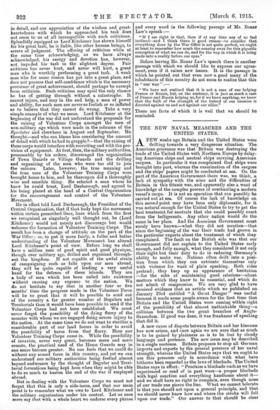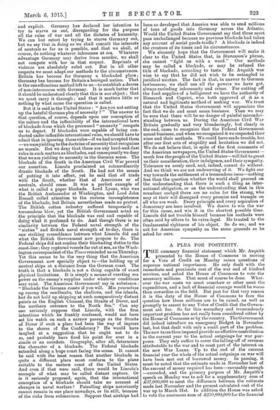THE NEW NAVAL MEASURES AND THE UNITED STATES.
AFEW weeks ago Britain and the United States were drifting towards a very dangerous situation. The American grievance was that Britain was destroying the trade of the United States with Northern Europe by delay- ing American ships and neutral ships carrying American cargoes. In particular it was complained that ships were brought into port, whereas the examination of the cargoes and the ships' papers might be conducted at sea. On the part of the American Government there was, we think, a lack of sympathy with the aims and the difficulties of Britain in this titanic war, and apparently also a want of knowledge of the complex process of overhauling a modern vessel's cargo. It is not an operation that can possibly be carried out at sea. Of course the lack of knowledge on this second point may have been only diplomatic, for it was natural enough for the United States to try to get the best treatment for neutrals that she could possibly exact from the belligerents. Any other nation would do the same in her place. And the American Government must surely have known—what they did not mention—that since the beginning of the war their trade had grown in the particular exports about the treatment of which they complained. The fault on the British aide was that our Government did not explain to the United States early enough, and fully enough, what they considered it not only their right but their duty to do in reducing Germany's ability to make war. Nations often drift into a posi- tion from which they can extricate themselves only with violence for want of plain speaking. Both sides pretend, they keep up an appearance of hesitation —for the sake of maintaining good relations—about matters which they know to be essential, and which do not admit of compromise. We are very glad to have received evidence that an article which we published on January 25rd entitled "A Great Danger" was useful because it made some people aware for the first time that Britain and the United States were coming within sight of the possibility of that almost unthinkable thing—a collision between the two great branches of Anglo- Saxondom. If good was done, it was frankness of speaking that did it.
A new cause of dispute between Britain and her kinsmen has now arisen, and once again we are sure that as much is to he gained by plainness as is to be lost by cloudy language and pretence. The new issue may be described in a single sentence. Britain proposes to stop all German imports and exports by the general pressure of her naval strength, whereas the United States says that we ought to use this pressure only in accordance with what have hitherto been regarded as the laws of blockade. The United States says in effect ; "Proclaim a blockade such as we have experienced or read of in past wars—a proper blockade with legal sanction and everything handsome about it— and we shall have no right to complain, even though none of our trade can pierce the line. W-hat we cannot tolerate is that you should net upon a general principle, and that we should never know how and where the stroke will fall upon our trade." Our answer to that should be clear and explicit. Germany has declared liar intention to try to starve us out, disregarding for the purpose all the rules of war and all the dictates of humanity. We can but retort by trying to starve Germany out, but we say that in doing so we shall consult the interests of neutrals so far as is possible, and that we shall, of course, do nothing whatever inhumane at sea. Whatever advantage Germany may derive from murder, we shall not compete with her in that respect. Reprisals of violence are absolutely ruled out. But in all other respects we must adapt our methods to the circumstances. Britain has become for Germany a blockaded place ; Germany has become for Britain a besieged nation. That is the one efficacious method left to us—to establish a decree of non-intercourse with Germany. It is much better that it should be understood clearly that this is our object ; that we must carry it through ; and that it matters little or nothing by what name the operation is called.
But it is said in the 'United States : "Are you not setting up the hateful German plea of necessity ? " The answer to that question, of course, depends upon our conception of the nature and the inflexibility of the international laws of blockade from which the presumed "necessity " compels us to depart. If blockades were capable of being con- ducted under inflexible international rules, we should have to admit that in ignoring those rules—if we had accepted them —we wereyielding to the doctrine of necessity that recognizes no morals. But we deny that there are any hard-and-fast rules in such matters as blockades, and consequently we deny that we are yielding to necessity in the German sense. The blockade of the South in the American Civil War proved our assertion. Lincoln proclaimed an extraordinarily drastic blockade of the South. He had not the means of putting it into effect, yet he said that all trade with the South, whether that of Americans or of neutrals, should cease. It was a perfect example of what is called a paper blockade. Lord Lyons, who was the British Ambassador at Washington, and Lord John Russell called attention to the curious incompleteness of the blockade, but Britain nevertheless made no protest. The British cotton industry suffered temporarily a tremendous blow, yet the British Government acted on the principle that the blockade was real and capable of doing what it professed to do. And though there is no similarity between the Federal naval strength of the "
sixties" and British naval strength of to-day, there is one striking resemblance between what Lincoln did and what the British Government now propose to do. The Federal ships did not confine their blockading duties to the coast-line; they captured vessels far out at sea, as the Wash- ington correspondent of the Times reminded us on Thursday. Yet this seems to be the very thing that the American Government now specially object to—the holding up of neutral ships at a distance from the German coast. The truth is that a blockade is not a thing capable of exact physical limitations. It is simply a means of exerting sea power on the enemy's supplies under whatever conditions may exist. The American Government say in substance "Blockade the German coasts if you will. Mix yourselves up among the sandbanks, the shallows, and the islands, but do not hold up shipping at such comparatively distant points as the English Channel, the Straits of Dover, and the northern entrance to the North Sea." Can any one seriously suppose that Lincoln, with the firm intentions which he frankly confessed, would not have Bet his watch on such a narrow passage as the Straits of Dover if such a place had been the way of ingress to the shores of the Confederacy ? He would have laughed at a suggestion that he ought not to do so, and probably have fixed his point for ever in a simile or an anecdote. Geography, after all, determines the character of a blockade. The Federal blockade extended along a huge coast facing the ocean. It cannot be said with the least reason that another blockade in quite a different place must conform to the plans suitable to the eastern coast of the United States. And even if that were said, there would be Lincoln's example of what may be called distant capture. Or is it seriously proposed, again, that the international conception of a blockade should take no account of changes in naval warfare ? Patrolling ships notoriously cannot remain in one place nowadays, or lie still, because of the risks from submarines. Suppose that airships had
been so developed that America was able to send millions of tons of goods into Germany across the Atlantic. Would the United States Government say that these must pass unchallenged because no previous blockade had taken any account of aerial goods-traffic ? A blockade is indeed the creature of its times and its circumstances.
We sincerely hope that the Government will make it clear to the United States that, in Stevenson's phrase, she cannot "fight us with a word." Our methods may be called a blockade, or may be refused the title of blockade, according to taste. Mr. Asquith was wise to say that he did not wish to be entangled in juridical niceties. The fact is that, in answer to German lawlessness, we shall use all the powers we have got, always excluding inhumanity and crime. For cutting off the food supplies of a belligerent we have the authority of Bismarck and Caprivi, who both approved of it as a natural and legitimate method of making war. We trust that the United States Government will appreciate the fact that we do and must mean business. Then we may be sure that there will be no danger of painful misunder- standing between us. During the American Civil War Britain gradually and very blunderingly, but clearly in the end, came to recognize that the Federal Government meant business, and when we recognized it we respected their aims and their methods. We could have made trouble, but after our first acts of stupidity and hesitation we did not. We do not believe that, in spite of the first comments of the American newspapers, the United States Government— much less the people of the United States—will fail to great us their consideration, their indulgence, and their sympathy. Tolerance we sorely need, and, indeed, cannot do without. And we think we are not undeserving of it. We fight our way towards the settlement of a tremendous issue—nothing less than the question whether the world shall proceed on the understanding that there is such a thing as inter- national obligation, or on the understanding that in this mundane cockpit there are no rules for the strong, who may at their will disregard every promise and trample on all who are weak. Every principle and every aspiration of democracy are here involved. We desire to win the war for this cause, and win it in the shortest possible time. Lincoln did not trouble himself because his methods were often said by others to be extra-legal. He trusted to the fundamental rightness of his object. So do we ; and we ask for American sympathy on the same grounds as he asked for ours.











































 Previous page
Previous page